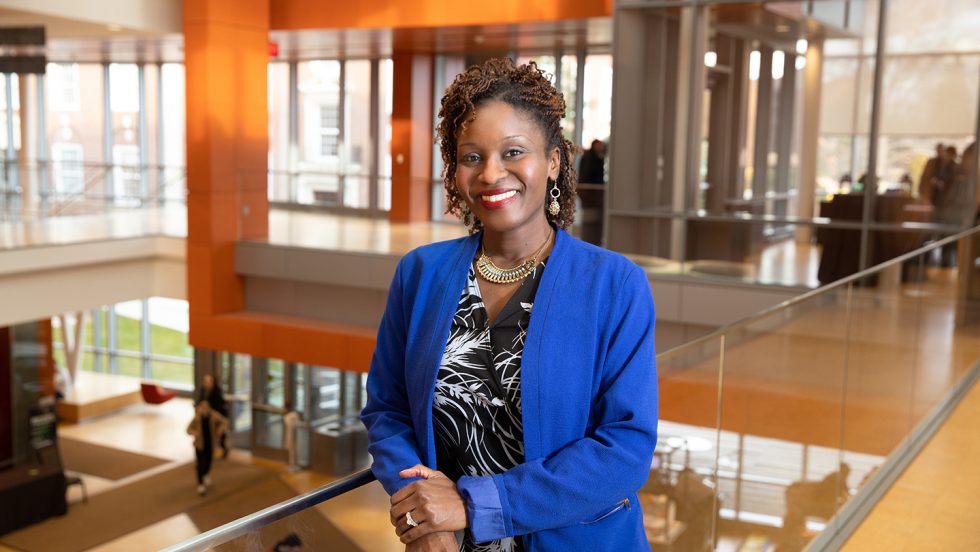
Adelphi’s award-winning Mentoring Program has helped bring about a culture shift at the University. Chotsani Williams West, MA ’07, who has led the program since its inception in 2014, explains its recipe for success.
Chotsani Williams West, MA ’07, executive director of Diversity, Equity, Inclusion and Belonging, believes in the power of connection. That’s why she has served as the inaugural director of Adelphi’s award-winning Mentoring Program since its founding nine years ago.
In the past few years, she’s even helped colleges and schools at Adelphi start their own mentoring programs. In doing so, she’s helped bring about a culture shift at the University. She wrote about it—and offered advice on mentoring to other institutions—in an essay published this May in Faculty Focus titled “Creating a Culture of Mentoring on Campus.”
We talked with her about the importance of mentoring on campus and what makes for a successful program.
In your essay, you say that colleges are increasingly offering mentoring programs to support diversity, increase student success, and help students build stronger relationships. Not every college gets it right, though. What’s the secret to building a successful mentoring program on campus?
Chotsani Williams West: Pairing students one-to-one with the right mentor, and training both the mentors and the mentees, is so important. For instance, if you pair people based simply their academic interests, and that is the only basis for the relationship, you may have to start over with a new mentor if the student changes majors. So there needs to be a more foundational connection identified.
And that connection is really just a start. Mentors and mentees need to be prepared for their relationship and the mentoring journey. Good training should cover the communication piece, cultural competency and cultural responsiveness.
Developing a clear mission for the program is important, too. Who are you serving? What are the desired outcomes? How can it impact the student’s life beyond the classroom? What are the foundational pieces that training can help orient in mentors and mentees?
How does Adelphi train its mentors and mentees?
CWW: I conduct a two-hour training for participants when they join the program. I offer strategies around how to get the most out of their relationship. I ask, “What does it mean when you’re paired with someone who is, at least on the surface, opposite from you? How do you develop strategies to learn new things about a person with whom you’ve never interacted?”
The other piece that’s really important is the frequency that partners meet. There are evidence-based suggestions of how often meetings should occur and what’s been successful in the past, along with ways to monitor the relationship. I go through those suggestions, and then help pairs think about what they desire from the experience. A lot of our training is learning about the whys of the program. Whether they’ve been in the program for six months or two years, participants are always welcome to have a refresher course to brush up on their skills.
How has Adelphi’s mentoring program created a culture of mentoring?
CWW: Our students who have been mentees want to become mentors. That makes me so proud that they want to pay it forward. I often receive notes from alumni of the program asking how they can get involved and serve as mentors once they get settled after graduation.
The program has also helped people better appreciate and understand the value of mentoring. The program shows participants that it’s worthwhile for all students, particularly those from underrepresented or underserved communities, to be able to tap into someone else’s expertise, to seek someone else’s guidance.
The growth in the program shows how the culture of mentoring has grown. We launched the program in 2014 with 10 participants—five mentors and mentees. By 2021, 225 participants had been through the program. We planted a seed, and it’s growing.
Has mentoring become more important since the start of the pandemic?
CWW: Yes. All the virtual meetings and online communication have left many people feeling isolated, so there’s a new desire for real in-person connection. Mentees are responding much faster than in the past. If a mentor had to reach out to a student two or three times before the pandemic, now all it takes is one phone call typically. No one is taking it for granted that everybody’s OK and healthy, given what we’ve been through. Students really appreciate the value of connecting with a mentor.
How can Adelphi’s mentoring program be strengthened in the future?
CWW: We need to broaden our outreach efforts to students. We have found most students don’t discover the mentoring program until their sophomore or junior year. The feedback from them has been, “If I had known about the program sooner, then I would have joined sooner and learned more.” So we need to be more visible and make sure that we’re reaching as many students as possible.
Now that we are easing back into in-person activities after the pandemic, we can introduce more students to the program. We have workshops that are open to everyone, University-wide, that teach skills like financial literacy or career management and that serve as a good way to introduce students to the mentoring program. We have a 100 percent graduation rate for students in the mentoring program, so the sooner we reach students and get them involved, the better for all.
Read Chotsani Williams West’s essay “Creating a Culture of Mentoring on Campus,” which offers six strategies colleges and universities can use to support students.